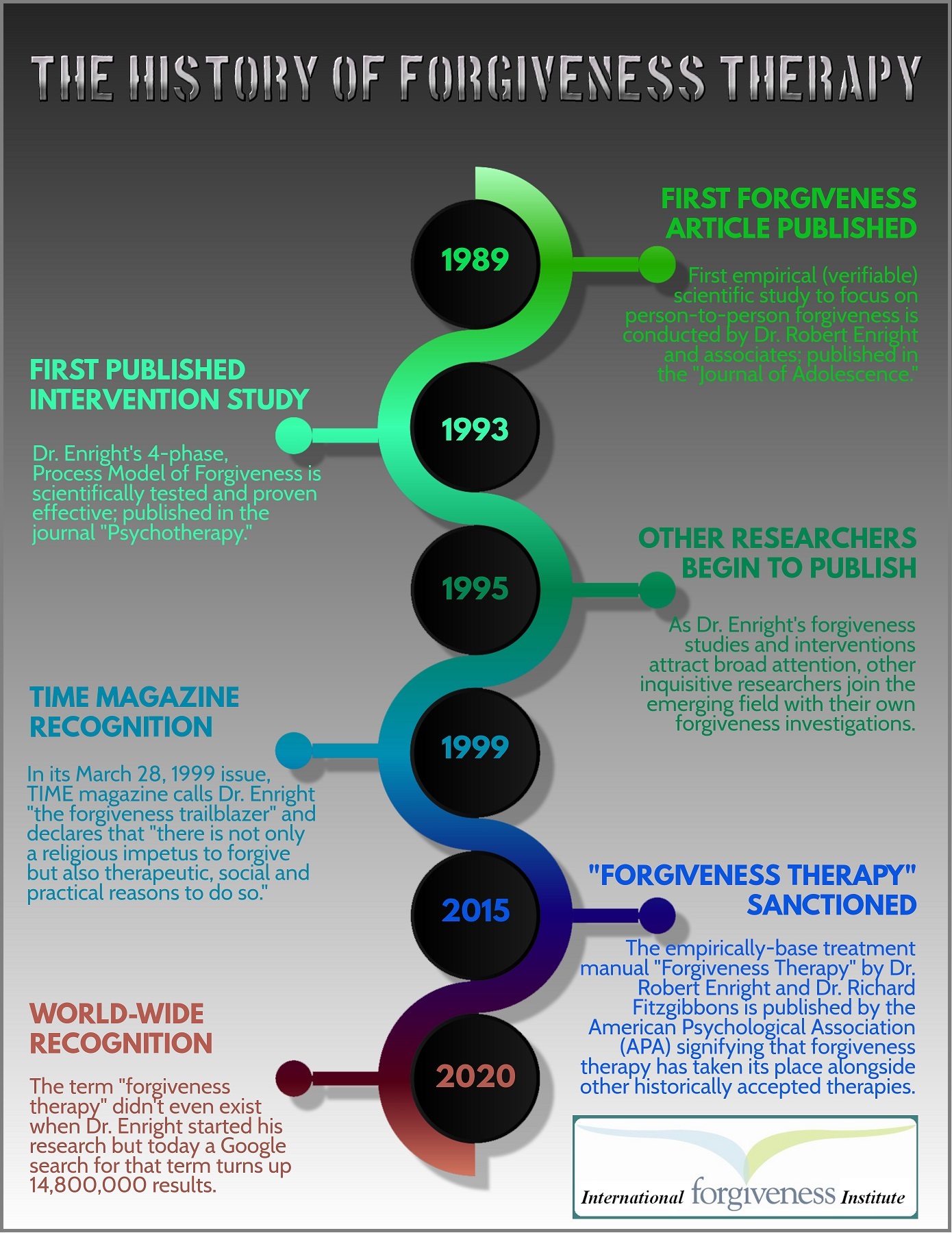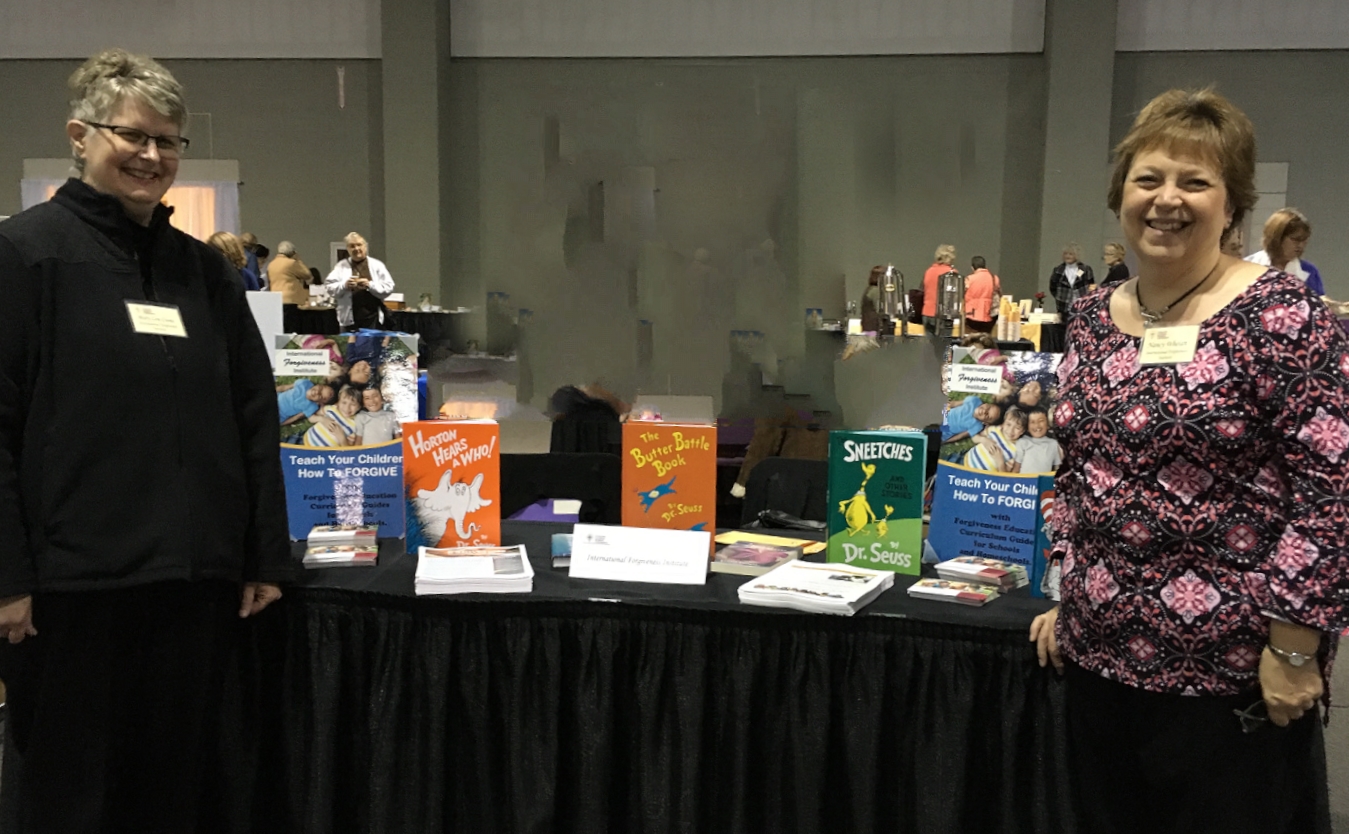Tagged: “Children”
Forgiveness: “Groundbreaking Scientific Discovery”
A cutting-edge organization in California that sponsors groundbreaking scientific discoveries has launched a new service called Greater Good in Action and added forgiveness to its list of practices that can help you improve your social or emotional well-being or the well-being of others including your children.
 The Greater Good Science Center (GGSC) at the University of California, Berkeley, not only studies the psychology, sociology, and neuroscience of well-being but also “teaches skills that foster a happier life and a more compassionate society–the science of a meaningful life.”
The Greater Good Science Center (GGSC) at the University of California, Berkeley, not only studies the psychology, sociology, and neuroscience of well-being but also “teaches skills that foster a happier life and a more compassionate society–the science of a meaningful life.”
The Greater Good in Action initiative adds forgiveness to its list of established practices that include compassion, generosity, gratitude, honesty and others. It is a new addition to a service the organization began in July of 2017, called Raising Caring, Courageous Kids that is designed to help parents raise kids of high character who treat others with compassion and respect.
In its inaugural forgiveness practice called Introducing Kids to Forgiveness, Greater Good in Action cites the pioneering forgiveness work of psychologist Robert Enright, Ph.D., and psychiatrist Richard Fitzgibbons, M.D. (co-authors of Forgiveness Therapy, a manual providing instructions for clinicians who want to incorporate forgiveness interventions into their therapy with clients.
Referencing Dr. Enright’s years of hands-on experience teaching children about forgiveness (he has developed 17 Forgiveness Curriculum Guides for kids in pre-school through 12th grade that are being used in more than 30 countries around the world), Greater Good in Action links readers to a separate dissertation on Dr. Enright’s insights into how to help children and adolescents learn and practice forgiveness.
That work concludes that “a wide range of studies have found that forgiveness programs can help kids of different ages feel better, strengthen their relationships, and improve their academic performance.”
Because conflict is inevitable, teaching children about forgiveness early on
may indeed be a path toward building communities
of people who prize and cultivate peace.
Maryam Abdullah, Ph.D., Parenting Program Director at Greater Good
and a developmental psychologist with expertise in parent-child relationships.
The practices provided by Greater Good in Action are for anyone who wants to improve his or her social and emotional well-being, or the well-being of others, but doesn’t necessarily have the time or money to invest in a formal program. Through its free online magazine Greater Good, the GGSC provides articles, videos, exercises, quizzes, podcasts, workshops and more for parents and families to help them foster positive attributes like forgiveness in themselves and their children.
How Forgiving Are You?
When someone does you wrong, are you more likely to turn the other cheek or slash their tires? Take the Greater Good Forgiveness Quiz to find out.
The History of Forgiveness Therapy
The prominence of forgiveness and forgiveness therapy in the field of psychology over the past few decades has been well-documented in the scientific literature. Also well documented has been the pioneering and groundbreaking forgiveness work of Dr. Robert Enright within that movement. Here are pertinent milestones:
Forgiveness Spotlight: Dr. Jichan J. Kim
Editor's Note: This is the first in a series of articles that will focus on former students of Dr. Robert Enright who have continued their forgiveness research activities after graduation and who have made their own mark on the forgiveness movement.
Dr. Jichan J. Kim is a South Korean native who studied under Dr. Enright for four years at the University of Wisconsin-Madison where he earned both his Masters and Ph.D. degrees in Educational Psychology while at the same time pursuing research projects that led Dr. Enright to call him “one of the most prolific graduate assistants I’ve ever instructed.”

Dr. Jichan J. Kim
During those four years, the two researchers worked together to conduct numerous forgiveness-related research projects including a study that explored how graduate-level theology students in South Korea perceived the difference between divine forgiveness and human forgiveness. The results of that project were published just last month in the Journal of Spirituality in Mental Health.
After graduation, Dr. Kim left UW-Madison to become Assistant Professor of Psychology at Liberty University in Lynchburg, VA–a world-class Christian university founded by Dr. Jerry Falwell who gained international fame as an advisor to world leaders and who was named one of the 25 Most Influential People in America by U.S. News & World Report in 1983. Liberty University is one of the largest Christian universities in the world with more than 15,000 students attending classes on campus and more than 94,000 students taking courses through Liberty University Online.
At Liberty University, Dr. Kim teaches Introduction to Research, Directed Research, and Psychology and Christianity. In Spring 2020, he is teaching a
semester-long, special topics course in forgiveness,
for which he is very excited. He is also leading a Psychology Study Abroad Trip to South Korea in June 2020 where students will learn about: 1) the aspects of a collectivistic culture in contrast to an American individualistic culture; and, 2) how that culture views forgiveness and reconciliation.
The full course load complements Dr. Kim’s research activities. Since leaving UW-Madison three years ago, Dr. Kim has become even more intricately involved in forgiveness research and forgiveness education both in the US and in his home country of South Korea. His research and studies, for example, have:
- Examined the relationship between forgiveness and compassionate love;
- Explored the idea of the school as the Just and Merciful Community;
- Validated the Enright Self-Forgiveness Inventory;
- Examined subjective reasons why individuals forgive;
- Evaluated, together with his undergraduate research team at Liberty University, the effectiveness of a family-based forgiveness program with more than a dozen volunteer families; and,
- Explored the relationship between interpersonal, self-, and divine forgiveness.
“I give special thanks to Dr. Enright for introducing to me the beauty of forgiveness. I owe him a great deal and I will try my best to follow in his footsteps through a life dedicated to driving out hatred through forgiving love.”
Dr. Jichan J. Kim
 In addition to his UW-Madison degrees, Dr. Kim has received degrees from Harvard University (Cambridge, MA), Gordon-Conwell Theological Seminary (South Hamilton, MA), and City College of New York. He also has extensive ministry experience in Madison, New York City, and Boston (serving various age groups in Korean immigrant congregations).
In addition to his UW-Madison degrees, Dr. Kim has received degrees from Harvard University (Cambridge, MA), Gordon-Conwell Theological Seminary (South Hamilton, MA), and City College of New York. He also has extensive ministry experience in Madison, New York City, and Boston (serving various age groups in Korean immigrant congregations).
Dr. Kim and his wife, Jieun, have three children–Yewon (Arianna), Juwon (Aiden), and Sungwon (Joseph). For the past several years, Dr. Kim has financially supported the International Forgiveness Institute with an automatic monthly donation through PayPal. He says he has two favorite quotes he tries to live by:
- Love never fails. (1 Corinthians 13:8)
- Forgiveness is offering love to a person in the face of injustice and at a time when that person is most unlovable. (Dr. Robert Enright)
Read more:
- Dr. Kim’s biography on the Liberty University website.
- Dr. Kim’s Ph.D. Dissertation on the effectiveness of anti-bullying programs.
- Abstracts of all Dr. Kim’s Forgiveness Research Studies.
- Inoculating Children Against Violence through Forgiveness Education – a Poster Presentation jointly developed by Dr. Kim and Dr. Enright.
Teaching Children About Forgiveness Results in Mature Adult Thinking About Forgiveness
“If you’ve seen your children struggle to forgive someone for hurting them, you know that forgiveness is complicated,” says Dr. Robert Enright, co-founder of the International Forgiveness Institute. “After all, forgiveness is complicated for adults, too.”
Rather than discourage us, however, that reality should in fact encourage parents and teachers to begin teaching children about forgiveness as early as possible and certainly by the time they are in pre-kindergarten, Dr. Enright outlines in an article posted yesterday in Greater Good Magazine. Entitled How We Think About Forgiveness at Different Ages, the article describes how a child’s understanding of forgiving develops as she grows older.
“In over 30 years of studying forgiveness, I have interviewed children and adolescents, as well as college students and adults—and found that our understanding of forgiveness evolves over childhood and young adulthood, partly influenced by what we learn from our parents and communities,” Dr. Enright says.
“Helping our children reach their highest level of forgiving can set them up to live a life without unhealthy anger and with more peace.”
Dr. Robert Enright
Dr. Enright’s research indicates that no matter what age a child is at, he starts with some misconceptions about forgiveness including these:
- Young children often believe that the proclamation of “I am sorry” followed by the automatic reply of “I forgive you” can solve any conflict.
- Fourth graders often equate it with first getting even.
- Many 9 to 10-year-old children think they could forgive and make up with classmates only if those classmates first got what they deserved–punishment for their misbehavior.
- Compared to fourth graders, seventh graders usually develop what is called a “reciprocal perspective” where they can think of themselves and others at the same time but they often say it will be easier to forgive if they are first compensated for what happened to them.
- Many 10th graders take a more complex view of forgiving where the focus is on their peer group and their family context. Here they can understand that forgiveness is not the same as reconciliation, and that it is possible to forgive while seeking justice. At the same time, however, there is a tendency to occasionally over-emphasize the advice of the peer group. If the group frowns on the idea of forgiving, then the person may refrain from offering the mercy of forgiveness toward those who were unfair.
Those and other misconceptions children hold about forgiveness can be overcome as they learn and practice true forgiveness, according to Dr. Enright.
“Children can reach a profound understanding of forgiveness in adulthood by persistently practicing it, with the help of parents, when they are hurt by others,” Dr. Enright adds. “Such learning, begun early in life, is a building block for mature adult thinking about forgiveness. Worldwide, it is one path toward peace.”
Read the full article: How We Think About Forgiveness at Different Ages
![]() Through articles, videos, quizzes, and podcasts, Greater Good Magazine bridges the gap between scientific journals and people’s daily lives, particularly for parents, educators, business leaders, and health care professionals. Its goal is to turn scientific research into tools and tips for a happier life and a more compassionate society.
Through articles, videos, quizzes, and podcasts, Greater Good Magazine bridges the gap between scientific journals and people’s daily lives, particularly for parents, educators, business leaders, and health care professionals. Its goal is to turn scientific research into tools and tips for a happier life and a more compassionate society.
Greater Good Magazine is published by the Greater Good Science Center (GGSC) at the University of California, Berkeley. Since 2001, the GGSC has been at the fore of a new scientific movement to explore the roots of happy and compassionate individuals, strong social bonds, and altruistic behavior—the science of a meaningful life.
Learn more at the Greater Good Science Center:
- How to Help Your Kids Understand Forgiveness – a 2 min. 17 sec. video subtitled “Instead of retaliating, our kids can learn to find peace by making the choice to forgive.”
- How to Gradually Introduce Kids to the Idea of Forgiveness – Young kids can learn the building blocks of forgiveness and develop them as they get older.
- Why Kids Need to Learn How to Forgive – Forgiveness heals hurts and is good for the forgiver–even the young ones.
- Does Forgiveness Make Kids Happier? – Spoiler alert: It Does.
- Parenting Videos: Raising Caring, Courageous Kids – A fun new video series.
Volunteers in Syracuse, New York, Reach Out to Spread the Word About Forgiveness Education
Mary Lou Coons is one of those always-optimistic individuals who uses every tool available to her to overcome life’s adversities–like the brain and spinal cord maladies that have caused her to endure repeated surgeries and years of suffering. Not one to be slowed down by such difficulties, Mary Lou decided to become a self-appointed “forgiveness ambassador” and has been on a mission to teach as many others as she can about the benefits of forgiveness.
This year alone, Mary Lou (who lives in Syracuse, NY) has:
- Single-handedly convinced her parish elementary school to adopt Forgiveness Education in all of its classrooms from pre-kindergarten

Mary Lou Coons with her puppet Lily.
through 6th grade;
- Organized and set up a booth to promote forgiveness to the more than 1,000 attendees at a Women’s Conference in Syracuse, NY–resulting in more of the state’s schools considering the use of Forgiveness Curriculum Guides;
- Developed Forgiveness Education videos featuring her puppet Lily through the Puppets For Peace Foundation she established 13-years-ago; and,
- Introduced Dr. Enright and his staff to two native-Rwandan missionaries who quickly agreed to teach the IFI Forgiveness Education Program in three grade schools they established following the Rwandan Civil War and Genocide.
Mary Lou first contacted the International Forgiveness Institute (IFI) more than seven years ago just days after her second Chiari Malformation brain surgery (technically known as posterior fossa decompression surgery) at a Milwaukee, WI hospital. She had learned that IFI-founder Dr. Robert Enright was pioneering Forgiveness Education work with children and she thought her passion for ventriloquism and puppets could somehow supplement those efforts.
Surgery after surgery, recovery after recovery, Mary Lou never abandoned her passion for her  Puppets For Peace Foundation and its mission of “spreading peace, love and joy to others.” With love and forgiveness at the heart of all her efforts, Mary Lou says she learned “how to suffer well” and how to give hope to others who were struggling, too.
Puppets For Peace Foundation and its mission of “spreading peace, love and joy to others.” With love and forgiveness at the heart of all her efforts, Mary Lou says she learned “how to suffer well” and how to give hope to others who were struggling, too.
“In order to suffer well, you need to love,” Mary Lou writes in one of her website blog entries. “When suffering is accepted with love, it is no longer suffering, but is changed into joy.”
Earlier this year, Mary Lou decided to talk about Dr. Enright’s forgiveness curriculum with one of the pre-K teachers at Holy Family School–a Roman Catholic elementary school on the west  edge of Syracuse. That teacher, Nancy Whelan, was so impressed that she arranged a meeting for Mary Lou with the school’s principal, Sister Christina Marie Luczynski.
edge of Syracuse. That teacher, Nancy Whelan, was so impressed that she arranged a meeting for Mary Lou with the school’s principal, Sister Christina Marie Luczynski.
Shortly after that meeting, Holy Family School officially joined the scores of other elementary schools in the state of New York and around the country that teach Forgiveness Education at every grade level. That IFI program uses proven Social Emotional Learning (SEL) techniques to teach students about the five moral qualities most important in forgiving another person–inherent worth, moral love, kindness, respect and generosity–and has been scientifically proven to benefit students by decreasing anger, increasing empathy and cooperation, and improving academic achievement.

Mary Lou Coons and Holy Family School teacher Nancy Whelan distributed forgiveness education materials at the October 26th 10th Annual Syracuse (NY) Catholic Women’s Conference.
Not content to recruit just one school into the program, Mary Lou teamed up with Nancy Whelan again and this time the dynamic duo set up a display booth at the 10th Annual Syracuse Catholic Women’s Conference. Together, the two women staffed a Forgiveness Education booth and tried to get forgiveness materials into the hands of every one of the more than 1,000 attendees crowded into the Convention Center for the Oct. 26 event.
Their on-site efforts and follow-up contacts resulted in several other Syracuse-area schools now considering using the IFI’s Forgiveness Education Curriculum Guides. Equally important, hundreds of New York women learned about the importance of forgiveness with many of them searching online for additional information causing a spike in the number of visitors to the IFI website following the Conference.
As part of her ongoing forgiveness mission, Mary Lou is now planning to develop a series of short videos with her favorite puppet Lily about forgiveness education and love. You can view one of her pilot vignettes called “Forgiveness Education” on her Puppets For Peace website.
Learn More:
- How Forgiveness Benefits Kids
- Forgiveness is a Skill That Children can Learn
- Why We Need Forgiveness Education–NOW
- Testimonials from Grade School Principals in Belfast, Northern Ireland
- New Study: Forgiveness Makes Kids Happier
- 3-Years of Milwaukee, WI Inner-City Schools Teacher Evaluations
- The Impact of Teaching 5th Graders About Forgiveness Education
Editor’s Note: Details on Forgiveness Education in Rwanda will be posted here shortly.



